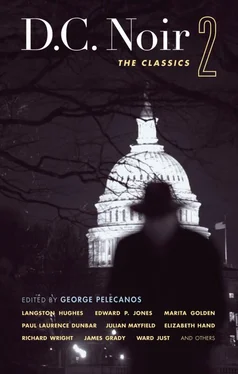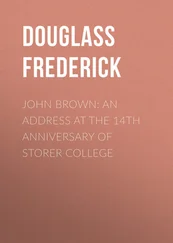I blinked. A siren wailed. I began to scream, standing in the middle of my room, alone, clutching at a bandana tied loosely around my neck. On the mattress on the floor David turned, groaning, and stared up at me with one bright blue eye.
“It’s just the firehouse,” he said, and reached to pull me back beside him. It was 5 a.m. He was still wearing the clothes he’d worn to the Lost and Found. So was I: I touched the bandana at my throat and thought of the young man at the railing beside me. “C’mon, you’ve hardly slept yet,” urged David. “You have to get a little sleep.”
He left the next day.
A few weeks later my mother came, ostensibly to visit her cousin in Chevy Chase but really to check on me. She found me spread-eagled on my bare mattress, screenless windows open to let the summer’s furnace heat pour like molten iron into the room. Around me were the posters I’d shredded and torn from the walls; on the walls were meaningless phrases, crushed remains of cockroaches and waterbugs, countless rust-colored handprints, bullet-shaped gouges where I’d dug my fingernails into the drywall.
“I think you should come home,” my mother said gently. She stared at my hands, fingertips netted with dried blood, my knuckles raw and seeping red. “I don’t think you really want to stay here. Do you? I think you should come home.”
I was too exhausted to argue. I threw what remained of my belongings into a few cardboard boxes, gave notice at the Smithsonian, and went home.
It’s thought that Rimbaud completed his entire body of work before his nineteenth birthday; the last collection of prose poems, Illuminations, indicates that he may have been profoundly affected by the time he spent in London in 1874. After that came journey and exile, years spent as an arms trader in Abyssinia until he came home to France to die, slowly and painfully, losing his right leg to syphilis, electrodes fastened to his nerveless arm in an attempt to regenerate life and motion. He died on the morning of November 10, 1891, at 10 o’clock. In his delirium he believed that he was back in Abyssinia, readying himself to depart upon a ship called Aphinar. He was thirty-seven years old.
I didn’t live at home for long — about ten months. I got a job at a bookstore; my mother drove me there each day on her way to work and picked me up on her way home. Evenings I ate dinner with her and my two younger sisters. Weekends I went out with friends I’d gone to high school with. I picked up the threads of a few relationships begun and abandoned years earlier. I drank too much but not as much as before. I quit smoking.
I was nineteen. When Rimbaud was my age, he had already finished his life work. I hadn’t even started yet. He had changed the world; I could barely change my socks. He had walked through the wall, but I had only smashed my head against it, fruitlessly, in anguish and despair. It had defeated me, and I hadn’t even left a mark.
Eventually I returned to D.C. I got my old job back at the Smithsonian, squatted for a while with friends in Northeast, got an apartment, a boyfriend, a promotion. By the time I returned to the city David had graduated from the Divine. We spoke on the phone a few times: He had a steady boyfriend now, an older man, a businessman from France. David was going to Paris with him to live. Marcy married well and moved to Aspen. Bunny got out of the hospital and was doing much better; over the next few decades, she would be my only real contact with that other life, the only one of us who kept in touch with everyone.
Slowly, slowly, I began to see things differently. Slowly I began to see that there were other ways to bring down a wall: that you could dismantle it, brick by brick, stone by stone, over years and years and years. The wall would always be there — at least for me it is — but sometimes I can see where I’ve made a mark in it, a chink where I can put my eye and look through to the other side. Only for a moment; but I know better now than to expect more than that.
I talked to David only a few more times over the years, and finally not at all. When we last spoke, maybe fifteen years ago, he told me that he was HIV positive. A few years after that Bunny told me that the virus had gone into full-blown AIDS, and that he had moved home to live with his father in Pennsylvania. Then a few years after that she told me no, he was living in France again, she had heard from him and he seemed to be better.
Cela s’est passé, the young man had told me as we watched the men dancing in the L&F twenty-six years ago. That is over.
Yesterday I was at Waterloo Station in London, hurrying to catch the train to Basingstoke. I walked past the Eurostar terminal, the sleek Paris-bound bullet trains like marine animals waiting to churn their way back through the Chunnel. Curved glass walls separated me from them; armed security patrols and British soldiers strode along the platform, checking passenger IDs and waving people to the trains.
I was just turning toward the old station when I saw them. They were standing in front of a glass wall like an aquarium’s: a middle-aged man in an expensive-looking dark blue overcoat, his black hair still thick though graying at the temples, his hand resting on the shoulder of his companion. A slightly younger man, very thin, his face gaunt and ravaged, burned the color of new brick by the sun, his fair hair gone to gray. He was leaning on a cane; when the older man gestured, he turned and began to walk slowly, painstakingly down the platform. I stopped and watched: I wanted to call out, to see if they would turn and answer, but the blue-washed glass barrier would have muted any sound I made.
I turned, blinking in the light of midday, touched the bandana at my throat and the notebook in my pocket; and hurried on. They would not have seen me anyway. They were already boarding the train. They were on their way to Paris.
Christmas in Dodge City
by Benjamin M. Schutz
(Originally published in 2005)
6th & O Streets, N.W.
Sharnella Watkins had never walked into a police station in her life. She’d been tossed in delirious or drunk, carried in kicking and screaming, and marched in on a manacled chorus line. But walk in on her own, never. That would have been like sex. Another thing that if it was up to her, she’d never do.
She checked both ways before she crossed the street, searching for witnesses, not traffic, and clattered over on her nosebleed heels.
She knocked on the bulletproof plastic at the information center.
The desk sergeant looked up from his racing form. “Help you, ma’am?”
“I’d like to talk to that detective, the big one. He’s bald and he gots a beard down in front, ah, you know, ah Van Dyke they calls it, oh yeah, he wears glasses, too.”
“That’s detective Bitterman, ma’am, and why would you like to talk to him?”
“It’s personal.”
“Well, he’s working now. Why don’t you come back when his shift ends?”
“When’s that?”
“Six o’clock.”
“I can’t wait that long. Can you give me his phone number? I’ll call him.”
“Sorry, ma’am, I can’t do that. Unless you’re family. You aren’t family, are you?” The desk man sniggered. Big Bad Bitterman and this itty-bitty black junkie whore.
“No, I guess you’re not. Sorry ’bout that.” The desk man looked down, trying to root out a winner in all those optimistic names.
Sharnella knew the truth would be pointless, but along with a nonexistent gag reflex, the other gift that had kept her alive on the streets all these years was the unerring ability to pick the right lie when she had to.
She leaned forward so that her bright red lips were only inches from the divider and sneered. Then, shaking her head, she said, “You think you’re so smart. Well, lets me tell you something. It ain’t me what needs him. He’s been looking for me. He wants to talk to me. And now, I’m telling you both, to go fuck yo’selves. I ain’t coming back, and I ain’t gonna talk to him and …” She got close enough for the desk man to count her missing molars: “I’m gonna tell him it was your sorry bullshit what pissed me off and he should see you ’bout why he can’t solve no cases no more.”
Читать дальше











